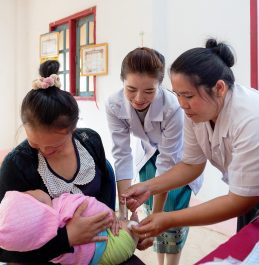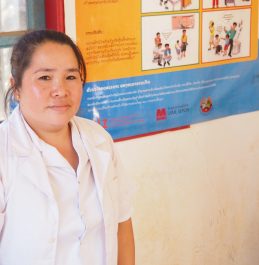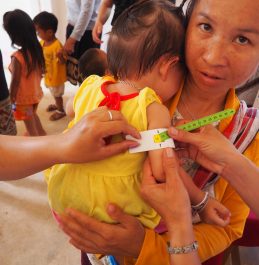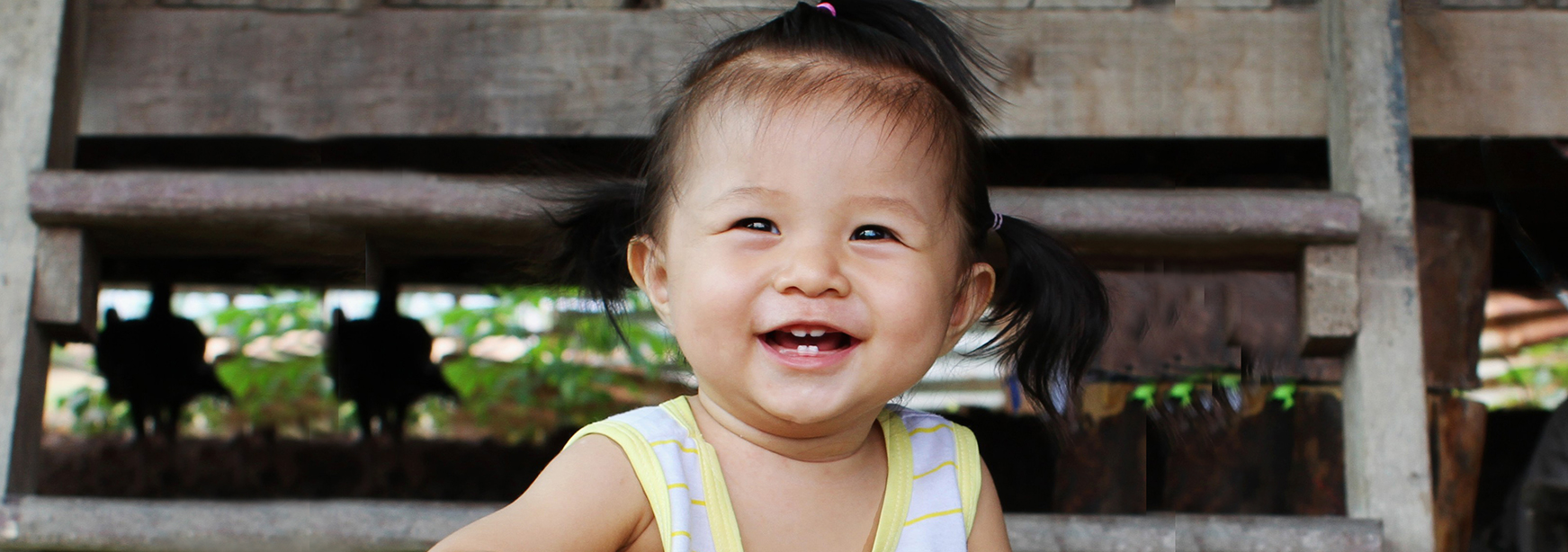The first 1,000 days of a child’s life are critical for setting the foundations of lifelong health. Insufficient amounts of zinc and other micronutrients during this period can result in serious health problems including irreversible stunting, impaired brain development, lower IQ, weakened immune systems and a greater risk of developing chronic disease.
MMG, UNICEF and the Lao Women’s Union have partnered since 2012 to fight child malnutrition and improve the health of children in Lao PDR through the 1000 Day Project. Supporting the United Nation’s Sustainable Development Goal (SDG) of ‘zero hunger’, the project has worked with many communities in Lao PDR to improve child health.
The 1000 Day Project has reached more than 120,000 families with nutritional interventions, including providing 2.5 million sachets of ‘Superkid’ micronutrient powder to fortify the diets of young children. In addition, more than 57,000 children have received vitamin supplements and 31,000 received deworming tablets. In April 2016, MMG announced additional funding for a second phase of the 1000 Day Project. This will leverage existing gains and expand provision of nutritional services, including distribution of micronutrients to children across 22 districts in four provinces.
MMG is proud to partner with UNICEF and the Lao Women’s Union to deliver this important project.
‘Superkid’ at Nam Pa Village
At Nam Pa village in Vilabouly district, Savannakhet province, Lao PDR, local nurse Kaidaphan is tending to mothers and their children in a busy community hall. Dozens of mothers have brought their children to her to be weighed, measured and immunised. Alongside the babies crying in the hall, three children sit patiently on a makeshift desk waiting to have the circumference of their arms measured.
Kaidaphan’s work at Nam Pa is part of the 1000 Day Project – a partnership between Sepon, UNICEF, and the Lao Women’s Union – and her use of the Mid-Upper Arm Circumference (MUAC) Measuring Tape is consistent with international leading practice.
The MUAC tape is used to assess a child’s nutritional status and is divided into three distinctly coloured sections; red, yellow and green, each reflecting different degrees of nutrition. If a child’s arm circumference falls into the red category they require immediate medical attention and nutritional support; yellow indicates that a child is at risk of acute malnutrition and requires additional support; and green indicates that a child is well nourished. The child in Kaidaphan’s arms is measured and only just falls into the yellow section – Kaidaphan looks worried.
The mothers and their children have come into the building where Kaidaphan and a handful of other nurses are working following a community Superkid demonstration and nutrition talk. Superkid is a nutritional supplement powder provided free of charge to parents. Some of the mothers had seen the presentation before, but for many of them it’s the first time and the information included is vital for their children’s health. The project presenters talk with the mothers about the importance of breastfeeding, especially in the first six months, and how best to provide children with a balanced diet. There’s a cooking demonstration involving the addition of Superkid. The project’s success has been built on its ability to train over 1,600 Lao Women’s Union volunteers and health workers in nutrition promotion, the importance of micronutrients, and counselling on appropriate feeding practices. A parent’s commitment to the lessons provided by these advocates will influence the MUAC colour that nurses, like Kaidaphan, will record for their child over time.
Kaidaphan has worked in the district as a nurse for 12 years and has been part of the project since it was first implemented. She believes the project has been pivotal in curbing malnourishment. Kaidaphan cites the education component of the program as crucial to its success, and through her work knows the community’s shift towards breastfeeding and improved child health has been substantial.
For more information, including results from phase 1, please see the 1000 Day Project brochure.
Pictured: Improving maternal and child nutrition across Lao PDR through the 1000 Day Project.
-
 Kaidaphan provides a child from Nam Pa village with inoculations.
Kaidaphan provides a child from Nam Pa village with inoculations. -
 Kaidaphan at her desk in Nam Pa village.
Kaidaphan at her desk in Nam Pa village. -
 A child's arm is measured with a MUAC measuring tape.
A child's arm is measured with a MUAC measuring tape.





